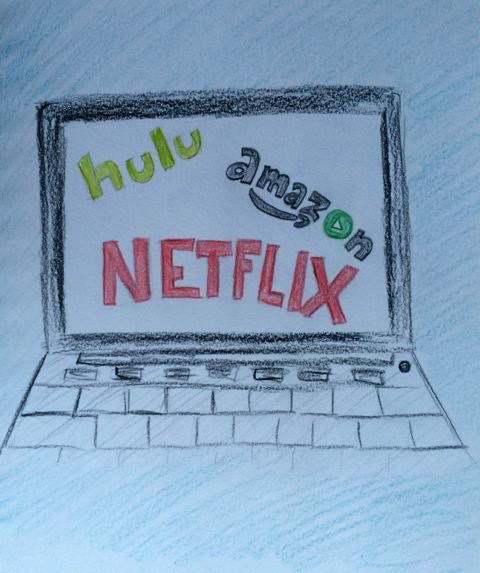Is Online TV taking over our lives?

Art credits to Divya Agrawal!
December 20, 2015
Do you subscribe to programs such as Hulu, Netflix, or Amazon Prime? If you answered yes, you are a part of a trend that is changing the television industry. Just last year, seventy-six percent of Americans claimed to have an online TV subscription. In fact, the United States is the largest growing market for online TV. Many students at Ridge believe that online TV usage is rapidly increasing throughout our generation.
Our generation, known as the “Trailing Millennials,” spends about fifty-seven percent of viewing time watching TV shows on computers or phones, and only forty-three percent of viewing time watching on actual TV sets. The time spent watching TV online is increasing rapidly and is overtaking the time spent watching on TV sets.
Not only are people becoming dependent on online TV for their daily entertainment, but they are also resorting to an action known as binge watching. Bingewatching is when a person watches multiple TV episodes consecutively. This is especially common when students immerse themselves in TV during their weekends and breaks.
Students, like many people, are unable to watch shows when they are being aired on TV due to their busy schedules. Students are continuously bombarded with homework, assessments, club meetings, and sports practices, leaving no leisure time for them to watch television on a network’s schedule.
Molly Weber ‘18 comments, “I don’t usually have time to watch TV because of activities and homework.” Online TV companies like Netflix or Hulu contain multiple past episodes of a TV show, including past seasons. This makes it easier for students to catch up on their favorite shows. The portability of smartphones and computers also make it easy for busy students to fit in viewing TV on their way to other places, such as school.
As for the future, one can expect to see a continuing increase in online TV and much more original online content, such as Orange is the New Black and House of Cards. Matthew White ‘19 states that his favorite part of online TV is that “There are more options on what you can watch.”
Most significantly, the key factor that is driving the growth of online TV is mobility. Last year, the average American spent 413 minutes monthly accessing online TV using their mobile device. Conversely, traditional television is experiencing a decline, and many people have decided to cord-cut, or get rid of their television sets. This new trend may result in our generation being the first to completely dispose of television sets.
